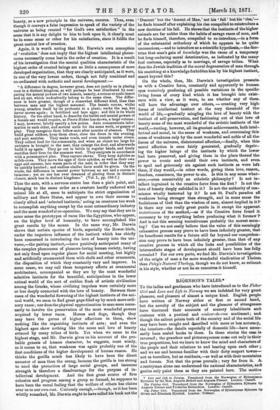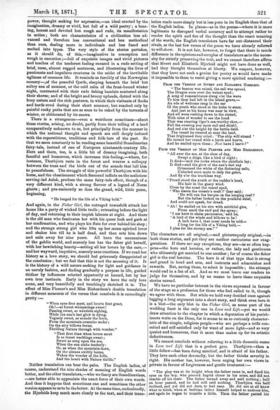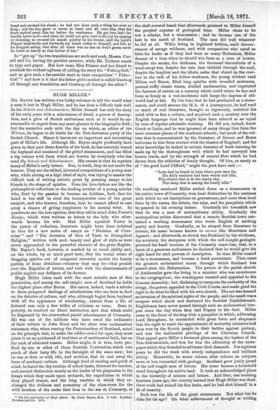BJURNSON'S TALES.*
To the ladies and gentleman who have introduced us to the Fisher Girl and Love and Life in Norway we are indebted for very great pleasure, and pleasure of almost a unique kind. English people- have written of Norway either at first or second hand, but the novelty of the subject and the glamour of strangeness- have tinctured their accounts of scenery inhabitants and+ customs with a poetical and couleur-de-rose sentiment ; and. though the salient points both of the country and of the social life may have been caught and described with more or less accuracy, the interiors—the details especially of domestic life—have neces- sarily been sealed books to them. In these stories the case is- reversed ; the grandeur and picturesqueness come out only in their- true proportions, but we learn to know the mind and characters of the people and their relations to and bearing upon each other and we see and become familiar with their dirty seaport towns— not as travellers, but as residents,—as well as with their mountains- and forests. Not that the prose prevails ; very far from it. A. countryman alone can understand the national characteristics, an& genius only paint them as they are painted here. The motive
• Love and Life in Norway. Translated from the Norwegian of BjUrnstjerne- Bjiirnsen by the Hon. Augusta Bethell and Augusta Pleener. London: Cassell.
The Fishing Girl. Translated from the Norwegian of Bjiirnstem Bjornson by- Augusta Piesner and Frederik& Richardson. London: Cassell.
The Fisher Girl. Translated from the Norwegian of Bit;niatjente Bjiirusen by Sivert and Elizabeth Hjerleid. London: Trilbner.
power, thought seeking for expression,—an ideal erected by the imagination, dreamy or vivid, but fall of a wild poetry ; a bear- ing, honest and devoted but rough and rude, its manifestation in action ; both are characteristics of a civilization leas ad- vanced and therefore less conventional and less methodical than ours, dealing more in individuals and less fused and melted into types. The very style of the stories partakes, as it should do, of this,—imaginative in conception and rough in execution ;—f nil of exquisite images and vivid pictures and touches of the tenderest feeling encased in a rude setting of brief, terse, almost rugged sentences, and illustrating the lives of passionate and impulsive creatures in the midst of the inevitable ugliness of common life. It reminds us forcibly of the Norwegian scenery—,of the peaceful fjords, sleeping beneath the brief but sultry sun of summer, or the cold calm of the frost-bound winter night, contrasted with their rude fishing hamlets scattered along their shores; and of the bright and breezy uplands, dotted with the busy sceters and the rich pastures, in which their visitants of flocks and herds revel during their short summer, but reached only by painful rocky paths that are so soon to be raked by the torrents of winter, or obliterated by its snows.
There is a strangeness—even a weirdness sometimes—about these stories, arising, no doubt, partly from their telling of a land comparatively unknown to us, but principally from the manner in which the national thought and speech are still deeply imbued with the superstitions, traditions and folk-lore of the past. So that we seem constantly to be reading some beautiful Scandinavian fairy-tale, instead of one of European nineteenth-century life. Here and there, too, is a little bit of dreamy imagining, both fanciful and humorous, which increases this feeling,—where, for instance, Thorbjiirn rests in the forest and weaves a colloquy between the trees and the birds out of the sounds that lull him to peacefulness. The struggle of this powerful Thorbjurn with his horse, and the chastisement which Smniund inflicts on the malicious serving-lad Adak, produce the same fairy-tale effect, though of a very different kind, with a strong flavour of a legend of Norse giants ; and pre-eminently so does the grand, wild, little poem, beginning,
"He longed for the life of a Viking bold."
And again, in the Fisher Girl, the outraged townsfolk attack her home like a party of wicked little trolls ; retreating before the light of day, and returning to their impish labours at night. And there is the old man who fascinates her with his queer look and garb at her confirmation, and who plays his flute for ever behind his shop ; and the strange strong girl who lifts up her mean-spirited lover and shakes him till he is half dead, and then sets him down and sails away for nine years. All have the uncanniness of the goblin world, and scarcely less has the fisher girl herself,
with her bewitching beauty—setting all her lovers by the ears,—
and her wayward, impulsive, scarcely sane emotions. If we read her history as a love story, we should feel grievously disappointed at the conclusion ; but we feel that this is not the meaning of it. It is the history of a wild nature seeking for light and guidance in nn unruly fashion, and finding gradually a purpose in life, guided thither by influences selected apparently at hazard, but by her own true instincts. Early in the story we have the only love scene, and very beautifully and touchingly sketched it is. The effect of Miss Plesner's and Miss Richardson's double translation in different measures of the verses that conclude it is exceedingly pretty :—
"When eyes first meet, and hearts first greet, Ohl—as forest-whisperings sweet!
Passing sweet, as wavelets sighing, While the sun's last glow is dying.
Vaguely sweet, as sounds the born, From the mountain-crannies under; On the airy billows borne, Thrilling Nature through with wonder."
"That first time when lovers meet Is as forest warblings sweet ; Sweet as song upon the sea, When the sun sinks tenderly: Or, as when the mountain-horn, On the silence swiftly borne, Wakes the wonder of the hills, And the heart with Nature thrills."
Neither translation can bear the palm. The English ladies, of course, understand the nice shades of meaning of English words better, and the other translators,—who we fancy are Scandinavians, —are better able to appreciate the exact force of their own words. And thus it happens that sometimes one and sometimes the other version appears to us to be the better. At the same time, undoubtedly, the Hjerleids keep much more closely to the text, and their trans-
lation reads more simply but is less pure in its English than that of the English ladies. In places—as in the poems—where it is more legitimate to disregard verbal accuracy and to attempt rather to render the spirit and fire of the thought than the exact meaning of the words, the English translators have far out-distanced their rivals, as the last few verses of the poem we have already referred to will show. It is not fair, however, to forget that there is much, difference in the opinions and scruples of translators as to the neces- sity for strictly preserving the text, and we cannot therefore affirm that Sivert and Elizabeth Hjerleid might not have done as well, had they thought themselves at liberty. We suspect, however, that they have not such a genius for poetry as would have made it impossible to them to resist giving a more spirited rendering :— Flew THE VERSION OF SWEET AND ELIZABETH EMBLEM.
"The beacon was raised, the sail was spread, The Dragon soon over the waters sped ;
A song of remembrance clang o'er the wave To him they had left in the island grave,—
An ode of welcome rang in the ear Of the youth who stood at the helm to steer.
And just as his home was near in view,
And all were rushing down to the strand, With cries of wonder to see the hand
That was steering Oger's sea-worthy shoe,—
Fell the evening sun upon sail and shield, And red o'er the height by the battle-field.
The vessel ho steered so near the land,
That frightened they cried: 'The ship will strand ' He turned her round with a lurch and heave, And he smiled upon them ; Now have I leave ?"
FROM THE VERSION OF MISS PLESNER AND MISS RICHARDSON.
"All over the sea, at the close of day, Swept a dirge, like a bird of night ; It died—'mid the rocks where tho chieftain lay; It died—and the glow of the sun's last ray Crimsoned the white of the fluttering sails, Unfurled once more to defy the gales, And fly o'er the trackless way.
"Proud stood the youth at the rudder's head, His hair in the gusty wind.
Close by the coast the vessel sped, Who steers the corsair's craft ?' they said; He will run the barque on the surging reef!'
But the father looked on the youthful chief, And could not speak, for dread.
" Ah ! he smiled on his sire with mirthful glee, From amid the surf and the spray; 'I am here to claim permission,' said he, 'A lord of the winds and billows to be !
A lack have I, that must needs be told—
I long for the life of a Viking bold,— I pine for the stormy sea!'"
The characters are all original,—aud picturesquely original,—ii both these stories, and yet they are neither caricatures nor exag- gerations. If there are any exceptions, they are—as so often hap- pens—the hero and heroine, or rather, the lady and gentleinan who ultimately get married to one another ; for of course the fisher girl is the real heroine. The hero is of that type that is strong and grand in head and arm, and instructs and admonishes and rewards. But, saving these, to select is impossible ; the attempt would end in a list of all. And so we must leave our readers to judge for themselves, and by no means to leave these exquisite stories unread.
We have no particular interest in the views expressed in favour- of the stage as a profession for those who feel called to it, thougb we agree with them. But while we hold very decided ones against lugging a long argument into a short story, and think even here it is a blot—the only blot in the Fisher Girl, as some part of the wedding feast is the only one in Love and Life—yet we would draw attention to the chapter in which a deputation of his parish- ioners waits on the Dean, for it seems to us so curiously character- istic of the simple, religious people—who are perhaps a trifle con- ceited and self-satisfied only for want of more light—and so very quaint and humorous, that it more than makes up for its artiatio defectiveness.
We cannot conclude without referring to a little domestic scene in Love and Life that is a perfect gem. Thorbjorn—then a little fellow—has been doing mischief, and is afraid of his father.. They love each other devotedly, but the father thinks severity is. right. His mother has, however, been urging her own views in private in favour of forgiveness and gentle treatment:— " The play was at its height when the father came in, and fixed his. eyes on the boy, who pressed Ingrid closer in his arms, and did not tumble off his chair. The father turned away and said nothing ; hale an hour passed, and he had still said nothing. Thorbjiim was halt inclined, and yet did not dare, to feel easy. He did not at all know what to think, when at bedtime father himself helped to undress him, and again he began to tremble a little. Then the father patted his Lead and stroked his cheek ; he had not done such a thing for ever so long; and the boy grew so warm at heart and all over him, that his tears melted away like ice before the sunbeams. He got into bed—he hardly knew how—and since he could not give vent to his joy by singing or shouting, he crossed his hands quietly on his breast, said the Lord's Prayer backwards and forwards six times softly to himself, and felt, as be dropped asleep, that after all there was no one on God's green earth be loved so dearly as that father of his."
In "get-up" the two translations are neck and neck, Messrs. Cas- sell and Co. having the prettier exterior, while Mr. Trabner excels in type and paper. But how came Miss Plesner and her friend to overlook the evident ugliness of calling the story the "Fishing Girl," and so give such a favourable start to their competitors' " Fisher- Girl" ? and how is it that the fisher-girl's mother is called Gunlaug all through one translation and Gunlang all through the other?




































 Previous page
Previous page